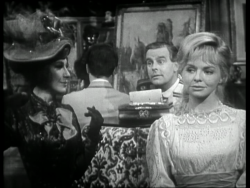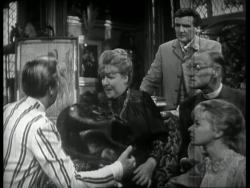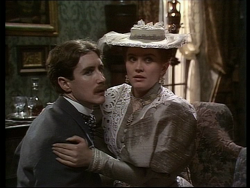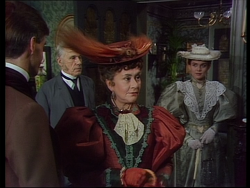by OLIVER WAKE

It occurred to me recently that with the obvious exception of Shakespeare, Oscar Wilde was surely British television’s most performed stage playwright. Perhaps unsurprisingly, the most-produced of his works has been his “trivial comedy for serious people”, The Importance of Being Earnest (1895). British television has staged this nine times (including heavily condensed versions) over the years, across three channels, in addition to mounting significant extracts at least three times. It is therefore surprising that, although the play has often been welcomed as a favourite, it has also been described as a play that is not “apt for television”. In this essay’s brief survey of versions of The Importance of Being Earnest, we will see why this claim was made and also get a sense of the shifting status of stage plays on television.
BBC television turned to Wilde and The Importance of Being Earnest early in its existence. It appeared in November 1937, mounted in common with standard practices in television drama at the time: broadcast as a live performance with a ‘repeat’ in the form of a second live performance four days later.1 Royston Morley was the producer but would also have directed under this job title. The Observer’s review suggests the play translated well into the still infant medium: “To compress The Importance of Being Earnest into forty-five minutes is something of a feat, but it was done, and television adds yet another to its growing list of worth-while dramatic presentations. Oscar Wilde’s sparkling comedy lost a little by cutting, but nothing through the new medium of production.”2
Intriguingly, according to the Radio Times it was scheduled to run for approximately 40 minutes on the first transmission but only 30 for the second, although both broadcasts were followed by a lengthy gap in scheduled programmes, allowing for some flexibility in their durations. The Screen Plays database gives a running time of 52 minutes, which I assume to be for the origination, whereas the review above suggests 45, though is probably only an approximation.3 Regardless, it was a very much reduced version of the play, which in its original three act version might be expected to run to nearly two hours. Although the Radio Times lists only four performers, the Kaleidoscope BBC Television Drama Research Guide offers a list that includes all the full play’s roles, indicating that no roles were eliminated in the play’s reduction.4 Almost certainly the adaptation would have been completed by Morley in his role as producer.
Morley oversaw a further production the following year, again with two broadcasts.5 Although the Radio Times gives each performance a 75-minute slot, the Kaleidoscope guide suggests a 90-minute duration. The first performance had a buffer of a 10-minute musical interlude bridging its conclusion and the evening news bulletin, whereas the second had no programmes immediately succeeding it, again allowing for some elasticity in the advertised running times. It appears therefore that this would have been a much more substantial version of the play than the 1937 broadcast. This production was significant as an early example of a more fluid use of the studio cameras than was common at the time, with panning to follow action and cutting within scenes, as opposed to the largely static single-camera-per-scene approach that was the norm in television drama.6 The television critic of The Observer was again impressed, finding it “admirably adapted to the medium.”7
In 1939 the BBC television service closed for the duration of the Second World War, but almost as soon as it reopened again in 1946 Morley was again producing a new Earnest. Running to 90 minutes this must have been a substantially complete version of the play, and, again, it was performed live twice in quick succession.8
It was two-and-a-half years until the next production, and this time the producer was Harold Clayton. This 1949 broadcast had a duration of 115 minutes, making it the longest of all television versions, and suggesting it comprised the entirety of Wilde’s text.9 That said, the production may have included an interval of unknown duration as this was a common practice in television at the time, meaning we should be cautious in equating listed durations with the completeness of the text in performance. After this, the BBC gave Earnest a rest for nearly 25 years.
As if following the BBC’s lead, ITV also turned early to Wilde and The Importance of Being Earnest. When ITV debuted on 22 September 1955 their first night’s programming included a pre-filmed extract from the play, staring John Gielgud as John Worthing, Edith Evans as Lady Bracknell and Margaret Leighton as Gwendolen Fairfax. The extracts comprised the Act I scenes of Worthing’s proposal to Gwendolen and his subsequent interrogation by Lady Bracknell, including the play’s most celebrated exchanges. The extract was directed by Quentin Lawrence and produced by Towers of London for ITV franchise ATV. Writing in The Manchester Guardian, Bernard Levin was enthusiastic:
It is many years since Dame Edith played Lady Bracknell [on stage] … and she was clearly determined to make up for lost time. She roared her battle-cry – “a handbag?” – like an indignant foghorn telling its mate that it had just been insulted, and the rest of her magnificent performance was pitched in the same key. The film around her, in so far as one was conscious of it, was admirably, indeed, beautifully composed.10
Less impressed was The Observer’s Maurice Richardson, who found ITV’s various drama extracts “a little disappointing”, with Gielgud “too grim” and Leighton “too grown-up”.11
ITV’s first attempt at the full play followed in 1958. This Associated Rediffusion production for Play of the Week ran to around 90 minutes, albeit including adverts.12 Director Ronald Marriott reported that he hoped “to infuse something of Wilde’s manner into this television production – a mixture of impudence and distinction, gaiety and elegance.”13 Contemporary criticism suggests that he may not have been successful, and it was seemingly not one of the best realisations of the play. Writing in The Stage and Television Today, Anthony Merryn reported that certain portions “seemed dated and unfunny”. He continued:
Ronald Marriott’s direction was lively enough, with its judicious selection of close-ups, but as a whole the sense of satirical enjoyment of the nonsense which a cast can impart to a stage production was absent from players who appeared a little conscious of TV’s reputation for “reality.” […]
Tony Britton, as Algernon, played a little too “straight.” Marita Hunt realised the ridiculous snobbishness of Lady Bracknell without attempting the stage “grand manner”: but she robbed the lady of some of her formidable superiority by allowing her an occasional benevolent smile, and one missed the big, bellowing disgust of her outraged “Found?” and “Handbag?”, which was replaced by a mere soft incredulity.14
The Times, meanwhile, reported a “bold distortion of the text” to make it fit television, going on to suggest:
It is hard to think of any play less apt for television. It demands the presence of an audience and is continually inviting them to react: if they do not one becomes uncomfortably aware of passages of deliberately flat writing which should be smothered in laughter. Moreover, the style of acting it requires will remain invincibly theatrical until television evolves its own way of handling artificial comedy.15
Clearly television producers did not agree, as the litany of productions of Earnest rolled on.

Although by this point in its life it was mainly a vehicle for new television writing, ITV’s premier drama anthology Armchair Theatre broadcast its Earnest in 1964, in a deliberate attempt to do something different in the series.16 Despite an extended duration of 77 minutes, as opposed to the series’ usual 50, significant cuts to Wilde’s text were required, perhaps most conspicuously in Act I prior to Lady Bracknell’s arrival. Directed by Bill Bain, the production was also notable for opening up the confines of the play with location recording for scenes around the Manor house in Act II. With actors including Susannah York, Pamela Brown, Iain Carmichael, Patrick Macnee, Irene Handl and Wilfred Brambell all clearly relishing their roles, the production is a spirited and entertaining ‘distilled essence’ of the play despite its relative brevity. It can be found on the Network DVD Armchair Theatre Volume 4.17
Either side of this production, excerpts from Earnest were used in two different series. Firstly, the ‘Comedy’ instalment of Southern Television’s Arts series The Full Man included an unknown scene from the play, amongst others.18 A further extract was broadcast by ITV in 1966 as part of ATV’s Conflict series for schools’ viewing, which included Keith Barron as John Worthing.19 Its cast list includes all the characters seen in Act I, including the manservant Lane who is only seen in that act, giving a good indication that the extract must have comprised the opening scenes of the play. This broadcast was introduced by John Gielgud and directed by George More O’Ferrall.
The BBC’s prestigious Play of the Month was launched in 1965 to showcase significant drama productions, so it was surely inevitable that sooner or later the series would get to The Importance of Being Earnest. Produced in 1974 by Cedric Messina, the BBC’s king of the theatrical canon, this Earnest was directed, perhaps surprisingly, by James MacTaggart, who was better known for his work with new and aggressively contemporary writing.20 At 110-minutes it was a full length production of the theatre text with only a few minor speeches and odd lines omitted. The cast rarely put a foot wrong, though Coral Browne’s Lady Bracknell is more understated than many, commanding her scenes with her steely resolve and confidence rather than just force of personality, as it can sometimes appear.
Some impressive sets, notably a surprisingly realistic studio garden, thanks to designer Eileen Diss, and MacTaggart’s unshowy but sympathetic direction, make this the most polished Earnest of those I was able to view for this survey. Writing in The Times, Leonard Buckley admired many of the performances, particularly Browne’s, as well as the costumes and the “colourful production tinged with the sepia tones of yesteryear”, which reminds us that this was the play’s first television production in colour.21
The final television productions of Earnest came in quick succession, as had the first. Channel Four’s version appeared on Christmas Day 1986, occupying a 110-minute slot, including adverts. Unlike all the prior television versions, this one was an in-theatre recording, made at the Watford Palace Theatre some four years earlier. It starred Wendy Hiller as Lady Bracknell, Gary Bond as Worthing, Jeremy Clyde as Algernon, Gabrielle Drake as Gwendolen, and Ann Thornton as Cecily. The stage production was directed by Michael Attenborough, with Michael Lindsay-Hogg directing the television recording.
The recording was produced by Consolidated Productions in partnership with Terence Donovan and London Weekend Television International, with the aim of overseas distribution, along with other similar play recordings. Its first known screening was in the United States in 1985, though it could also have been seen elsewhere. The lengthy delay between the recording and both the US and, even more so, the UK transmission suggests that the project may have been perceived as being less successful than hoped. Perhaps because of its timing, newspaper critics seem to have missed it and little information about the production is presently available in the public domain.

At time of writing, the most recent production of Earnest appeared in the BBC’s Theatre Night series in 1988, again running to 110 minutes.22 Unusually, and perhaps counter-productively, this production incorporated additional material drawn from Wilde’s early four-act version of the play. Most notably, this included the scene in which the solicitor Grigsby arrives at the Manor to escort ‘Ernest’ Worthing to prison as a result of his unpaid debts, and seizes Algernon while he impersonates John’s fictitious brother, leading to the farce of John appearing generous in settling the debts – really his own – to keep his ‘brother’ from prison. Despite its amusement, it is an unnecessary distraction from the main action of the play.

This final televisual Earnest was not well received by the critics. The Times’s William Holmes called it “a truly awful performance”, concluding: “This was Wilde as sitcom: banal and unaffecting.”23 Writing in The Guardian, Hugh Hebert wrote of the production: “Produced by Sean Sutton and directed by Stuart Burge it was a bit like looking at a newly cleaned painting. But instead of the colours coming up brighter and lighter, this process darkened Wilde’s text.”24 Neither review found in favour of Joan Plowright’s Lady Bracknell, the pivot character of the play. Their comments are perhaps overly harsh; this is a competent version of the play, but it does lack a certain sparkle in performance and the direction is workmanlike. You can judge for yourselves as the play is available on BBC DVD as part of The Oscar Wilde Collection.25
This brief survey of The Importance of Being Earnest on British television shows that both the BBC and independent television considered the play to have enduring popular appeal across a period of fifty years, with it notably being used around the opening/re-opening of television services. The number of productions indicates that Earnest was always considered a safe and reliable choice of play, at least across the period in which television drama was reliant on theatre texts. Indeed, the last two productions are something of an oddity: one being recorded in the theatre itself, the other as part of a self-consciously theatrical series, at a time when stage plays were a rarity on television. That Earnest has not been produced again for television for nearly twenty years both suggests that its enduring appeal is thought to have waned and reflects the fact that, however popular they may once have been, stage plays are no longer a regular part of British television.
Oliver Wake
With thanks to the BFI’s Research Viewing service and Reuben Library.
Originally posted: 30 June 2016.
